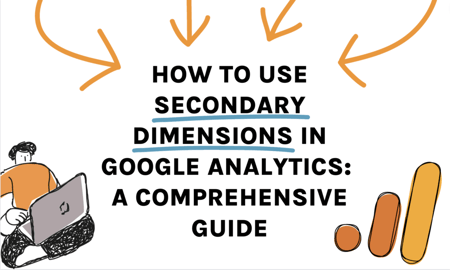Maximize Your Coverage Precision With Additional Measurements
In the realm of data analysis, the pursuit for accuracy and deepness is a perpetual search. Additional dimensions supply an entrance to boosting reporting precision by supplying a multifaceted lens where to watch information. Envision the power of unraveling detailed layers of info that lie beyond the surface area metrics, offering a richer tapestry of understandings waiting to be checked out. As we start this journey of leveraging additional measurements, the landscape of reporting precision beckons with guarantees of enhanced clarity and strategic decision-making.
Importance of Additional Dimensions
Utilizing second measurements is essential for enhancing the depth and granularity of reporting insights in data evaluation. By incorporating additional dimensions right into data evaluation procedures, businesses can get a more extensive understanding of their efficiency metrics. These additional measurements give an even more in-depth view of the main data, permitting for a much more nuanced interpretation of patterns and patterns. Additional dimensions enable analysts to segment and filter information based upon details standards, supplying an extra personalized and targeted analysis.
Furthermore, secondary dimensions aid in identifying correlations and connections that may not be promptly obvious when analyzing data with just main measurements. This much deeper degree of insight can bring about more educated decision-making and calculated planning within a company. By leveraging second measurements effectively, organizations can uncover covert chances, pinpoint locations for enhancement, and optimize their general performance.
Implementing Secondary Dimensions
To include second measurements efficiently right into data analysis processes, companies should take on a structured method that lines up with their reporting objectives and analytical goals. Carrying out secondary measurements involves picking the appropriate dimensions that offer deeper understandings into main data metrics. It is vital to recognize which secondary dimensions will certainly boost the understanding of the main information being analyzed. Companies should consider elements such as the type of data being collected, the certain metrics they wish to analyze, and the essential efficiency indications (KPIs) they are focused on boosting.
Furthermore, businesses need to make sure that the selected second measurements pertain to the key information and offer purposeful context without creating details overload. Executing secondary measurements additionally needs defining clear analytical questions that the extra measurements will assist answer. By structuring the execution procedure around these factors to consider, businesses can make the most of the value derived from additional dimensions and improve the accuracy and depth of their coverage.
Analyzing Information With Second Measurements

One secret facet of assessing information with second measurements is to make sure that the picked measurements line up with your certain logical objectives. Choosing the right additional dimensions can provide context and subtlety to your primary data metrics, allowing you to attract more exact final thoughts and make notified choices based upon the understandings gained.
Additionally, leveraging additional measurements properly can aid in identifying outliers, understanding the impact of various variables on your essential efficiency indications, and getting an extensive view of your data landscape. By diving right into information with second dimensions, you can enhance the depth and high quality of your analysis, bring about more durable reporting and actionable outcomes.

Enhancing Insights Through Secondary Dimensions
Exploring information with secondary measurements not just strengthens evaluation but also amplifies the potential for uncovering important insights that can significantly boost reporting accuracy. By adding additional measurements to your records, you can get an extra detailed understanding of the relationships in between different data points. When examining data with main measurements alone., this improved viewpoint enables you to recognize patterns, patterns, and correlations that might have been overlooked.

Essentially, leveraging secondary dimensions encourages you to draw out richer understandings from your data, enabling you to make even more informed choices and enhance your reporting precision.
Ideal Practices for Additional Dimensions
Utilizing additional dimensions efficiently requires careful consideration of essential approaches to improve information evaluation and reporting accuracy. When carrying out second dimensions, it is vital to straighten them with your main metrics to obtain meaningful insights.
Another essential method is to try out various mixes of primary and additional measurements to reveal unique connections and patterns within your information. This iterative method can expose important insights that might have been neglected otherwise. In addition, it is very important to frequently examine and improve your second dimension options to guarantee they continue to be pertinent and lined up with your developing reporting demands.
Additionally, documenting the reasoning behind your option of secondary dimensions can provide context for future analysis and facilitate cooperation within your group. By following these best methods, you can optimize the efficiency of second dimensions in improving your coverage accuracy Recommended Site and driving educated decision-making.
Final Thought
Including secondary measurements in data analysis is essential for maximizing reporting accuracy and obtaining deeper understandings into performance fads. Applying best techniques for secondary dimensions boosts the deepness of analysis and improves the importance of reporting results.
Furthermore, secondary measurements aid in determining relationships and connections that might not be click here to read immediately apparent when evaluating information with only primary dimensions. Applying additional measurements includes choosing the ideal measurements that supply much deeper understandings right into primary information metrics. Applying second dimensions additionally needs defining clear logical concerns that the added dimensions will assist address.When analyzing information with additional measurements, it is necessary to concentrate on extracting valuable insights that match main information metrics. By incorporating secondary dimensions into your evaluation, you can uncover patterns, fads, and partnerships that might not be apparent when looking at the information from a primary dimension alone.
Comments on “Advanced Search Engine Optimization Techniques: Leveraging Secondary Dimensions for Strategic Advantage”